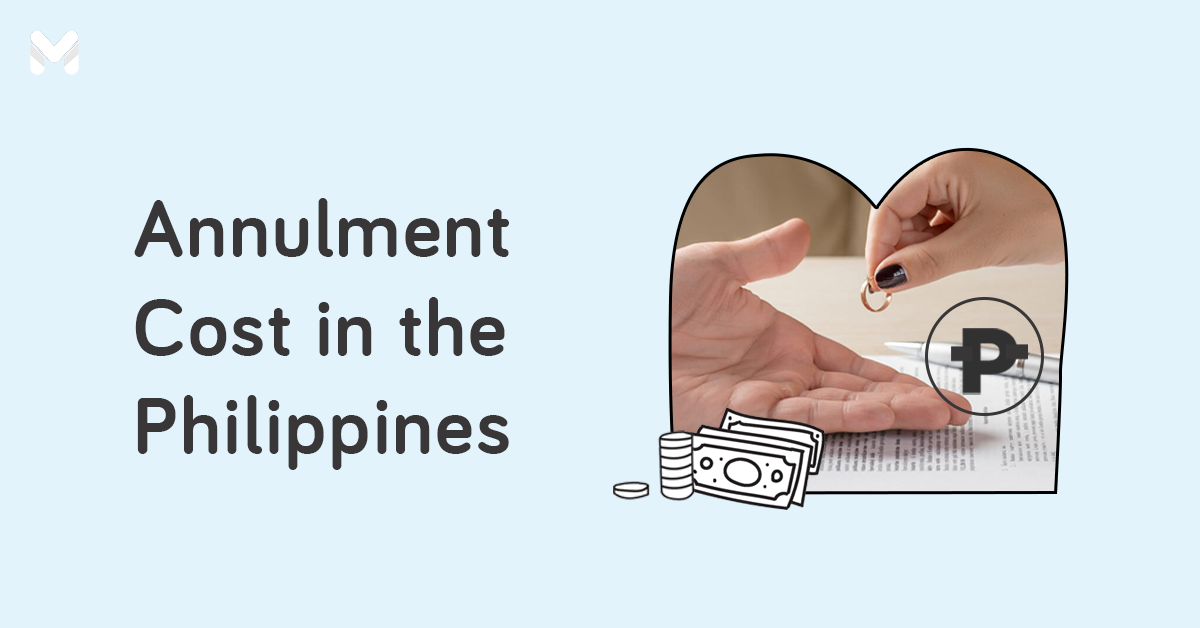Marriage isn't something people do on a whim. Just as you don't marry someone you met only yesterday, you don't get hitched without being legally ready.
Getting married won't be an easy ride, what with the many requirements soon-to-weds have to take care of. There's your CENOMAR, marriage license, and after the wedding, the marriage contract in the Philippines.
But that doesn't mean you shouldn't get married. Of course, you want your union to become legal and official. The point is, before you tie the knot, you have to be ready for all the paperwork it entails. Your dream wedding won't become a reality if you lack even just one requirement.
Here's everything Filipino and foreign couples need to know about how to get married in the Philippines.
Who Can Get Married in the Philippines?
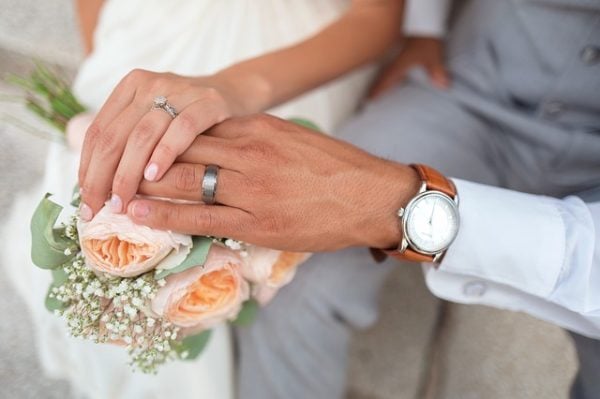
The Family Code of the Philippines[1] allows the marriage of people who meet the following requirements:
- A male and a female
- At least 18 years old
- Notarized parental consent for 18 to 20 years old
- Notarized parental advice for 21 to 25 years old
- Not blood relatives up to the fourth civil degree (i.e., cousins, siblings, etc.)
- Free of legal impediments such as being previously married to someone else (unless annulled, divorced, or widowed)
These legal requirements mean that people under the age of 18 can't get married even with their parents' consent. Also, same-sex marriage is not yet legal in the Philippines.
See also:
How to Get Married in the Philippines in 8 Steps
After making sure you're permitted by law to get married, the next crucial thing to do is to comply with the legal requirements for marriage. These wedding requirements in the Philippines include a marriage license and a marriage certificate (sometimes called the marriage contract).
Here are the requirements and the process for a wedding in the Philippines.
Step 1: Get Your PSA Birth Certificate

The first thing that should be on your checklist, even before you start with the wedding planning, is to secure your birth certificate.
Doing it in advance will give you ample time to verify your name, as well as that of your partner and parents, and have it corrected if necessary. This prevents any issues later on due to incorrect entries on your birth certificate or inconsistency between the details you provide in your marriage license application and those on your birth certificate.
Your birth certificate must be certified and issued by the Philippine Statistics Authority or PSA (formerly National Statistics Office or NSO). You can apply for this document at any PSA Serbilis Center[2] in the Philippines.
Or, for your convenience, get your PSA-certified birth certificate online via the PSA Serbilis website or PSAHelpline.ph. Check this guide on how to get a birth certificate from the PSA.
Alternatively, you may get a certified true copy of your birth certificate from the local civil registrar's office in the city hall or municipal hall that has jurisdiction over your birthplace. A certified true copy is accepted for the marriage license application.
Step 2: Request a CENOMAR

What is CENOMAR?
CENOMAR, which stands for Certificate of No Marriage Record, is a legal document certifying that a person has never been married.
Individually, you and your partner must secure a CENOMAR from the PSA. But if one or both of you are widowed, you need to get a death certificate of the deceased spouse (also from the PSA) instead of a CENOMAR.
What are the CENOMAR Requirements?
No documents are required to apply for a CENOMAR. Simply get it via the PSA Serbilis website or PSAHelpline.ph as you would when getting a birth certificate.
When requesting a CENOMAR online, you'll be asked to provide the following information:
- Your full name, birth date, birthplace, and address
- Father's full name
- Mother's full maiden name
- Number of copies requested
- Purpose of the certification i.e., marriage
How Much is the CENOMAR Fee?
The amount you'll have to pay depends on where you'll get a CENOMAR from. Getting this document online is more expensive because you'll be paying for convenience.
Here are the prices per copy of CENOMAR in the Philippines (as of 2022):
- PSA Serbilis Center (walk-in application): ₱210
- PSA Serbilis website (online application with delivery)
- Local delivery: ₱430
- International delivery: US$ 25.30
- PSAHelpline.ph (online application with delivery): ₱420
What is the CENOMAR Validity?
A CENOMAR is valid for six months from the date of issue indicated on the certificate. Thus, secure this document within six months or less before your wedding date.
Step 3: Get a Cedula
Go to the barangay hall, city hall, or municipal hall in the place where you or your fiancé lives to get a cedula.
A cedula, also called a residence certificate or community tax certificate, is one of the marriage license requirements that couples need to secure to get married in the Philippines. It proves that the bride, groom, or both are resident/s of the city or town. Getting a cedula is just quick and easy with a minimal fee.
Step 4: Apply for a Marriage License
What is a Marriage License?
A marriage license is a legal document verifying that a couple is eligible to marry. It's an important requirement for either a civil or church wedding in the Philippines.
What are the Requirements for a Marriage License?
Prepare the original copy and photocopy of the following documents from each of the couple:
- Original or certified true copy of birth certificate/baptismal certificate
- CENOMAR
- Community tax certificate (cedula)
- Recent 1 x 1 ID photo of both applicants
- Accomplished marriage license application form
For special cases, the couple must submit an additional requirement:
- Bride and/or groom aged 18 to 20: Affidavit of parental consent
- Bride and/or groom aged 21 to 25: Affidavit of parental advice
- Widowed: Death certificate of the deceased spouse (instead of the birth/baptismal certificate)
- Annulled previous marriage: Court decision and decree of absolute finality (instead of the birth/baptismal certificate)
- Divorced: Final decree of absolute divorce (instead of the birth/baptismal certificate)
- Foreigners: Valid passport and Certificate of Legal Capacity to Contract Marriage or any equivalent document issued by a foreign embassy in the Philippines (instead of the birth/baptismal certificate and CENOMAR)
How to Apply for a Marriage License in the Philippines
When you've secured all the requirements, you and your partner should personally apply for the marriage license together.
- Visit the local civil registrar (LCR) office in the city or municipality where you or your partner reside.
- Submit the marriage license requirements. The designated officer will check and evaluate the documents.
- Pay the marriage license fee to the treasury or treasurer's office. Present the official receipt to the LCR officer.
- Fill out four copies of the marriage license application form provided by the LCR office. Make sure to accomplish the bride's and groom's information sections correctly and completely.
- Attend the required pre-marriage counseling and family planning seminars. This can be held on the same day as your marriage license application within the city or municipal hall complex.
- Get your Certificate of Attendance and submit it to the LCR office.
- After 10 days, return to the LCR office and claim your marriage license. Two copies will be issued—one for your personal copy and another one that you'll give to your solemnizing officer.
How Much is the Marriage License Fee?
The cost of a marriage license varies per city or municipal hall, but it ranges from ₱250 to ₱352.
Inquire about any additional fees as well. For instance, in Quezon City, couples must pay ₱50 for the application form and ₱100 filing fee in addition to the marriage license fee of ₱100.[3]
What is the Marriage License Validity?
A marriage license is valid anywhere in the Philippines for 120 days from the date of issue. If you don't use it until the expiration date, the marriage license is considered canceled.
Marriage License Tips to Remember
- Don't apply for a marriage license too early or too late so that it's still valid on your wedding day.
- Take a leave of absence from work and arrive early. Government offices are open only from 8 a.m. to 5 p.m. on weekdays, and the entire process of getting this document (including the required seminars) might take a whole day.
- Refer to your birth certificate to find your mother's correct maiden name.
- Assign an authorized representative to claim the marriage license on your behalf if you can't pick it up due to a busy schedule. Your representative should present your authorization letter and valid ID to the LCR office.
Step 5: Book an Officiant
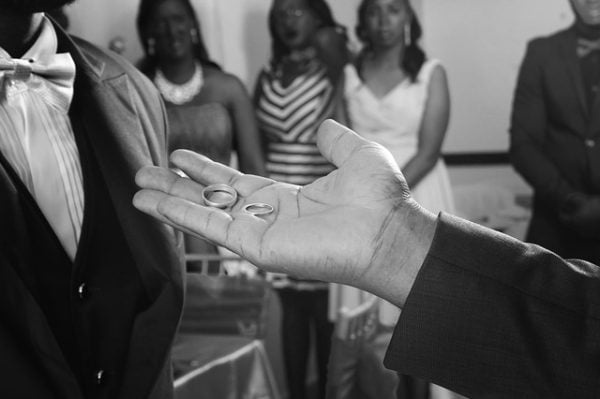
Once you've secured a marriage license, find a solemnizing officer who will officiate your wedding ceremony. Any of the following people are authorized to solemnize weddings in the Philippines:
- Priests, rabbis, or ministers of any registered church or religion in the Philippines
- Municipal judges, judges of the Courts of First Instance, Presiding Justice and the Justices of the Court of Appeals, or Chief Justice and Associate Justices of the Supreme Court
- City or municipal mayors
Book an appointment with your chosen wedding officiant. Before your wedding rites, you'll have to meet with your officiant and provide him with a copy of your marriage license.
Step 6: Invite Your Witnesses
At least two witnesses of legal age (18 years old and above) are required of anyone who will marry in the Philippines. Be sure that all your invited witnesses are available on your wedding date and are informed of the wedding details.
Tip: Have backup witnesses just in case the ones you initially invited suddenly become unavailable on your wedding day.
Step 7: Get Married

Once you've completed all the legal requirements for marriage, you can already get married!
On your wedding day, show up, say your "I do," and sign the marriage contract. Your officiant and witnesses will also have to sign your marriage certificate in the Philippines.
Related articles:
- Wedding Budget in the Philippines: How Much Do You Need to Tie the Knot?
- ₱100K Wedding Budget in the Philippines? Yes, It’s Possible!
- 15 Stunning Wedding Venues in the Philippines
Step 8: Get Your Marriage Certificate
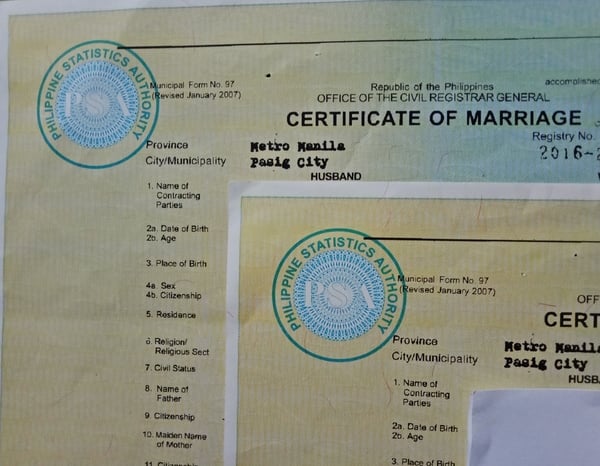
Now that you've been declared husband and wife, the only thing left to do is to get your marriage certificate.
Within 15 days after you get married, your solemnizing officer submits four copies of this certificate to the LCR office in the city or municipality where your wedding took place.
What is a Marriage Certificate?
A marriage certificate, commonly known as a marriage contract, is defined by the PSA as "a document that shows social union or a legal contract between people that creates kinship."[4] In simpler terms, this certificate is proof that a couple's union is deemed legal and valid.
Where and How to Get a Marriage Contract in the Philippines
You may get two kinds of copies of the marriage certificate: a certified true copy from the city or municipal hall and an authenticated copy from the PSA.
How to Apply for a Marriage Certificate from the Local Civil Registry:
- Present your valid ID
- Fill out a marriage contract application form
- Pay a fee (the cost varies per LCR office).
Your certified true copy of the marriage certificate may be issued within the day, or a week after if you prefer it in security paper (SECPA).
If you can't personally claim your marriage certificate, you can assign a representative to pick it up for you. The representative must present your authorization letter, your valid ID, and his/her valid ID.
How to Get a Marriage Contract from the PSA
You can get your PSA-certified marriage certificate online via the PSA Serbilis website or PSAHelpline.ph. When requesting this document, you'll be asked to provide the following details:
- Husband's full name
- Wife's full name
- Date of marriage
- Place of marriage
- Requestor's address
- Number of copies requested
- Purpose of getting a marriage certificate
FAQs on Getting Married in the Philippines
1. What is the difference between a marriage license and a marriage certificate?
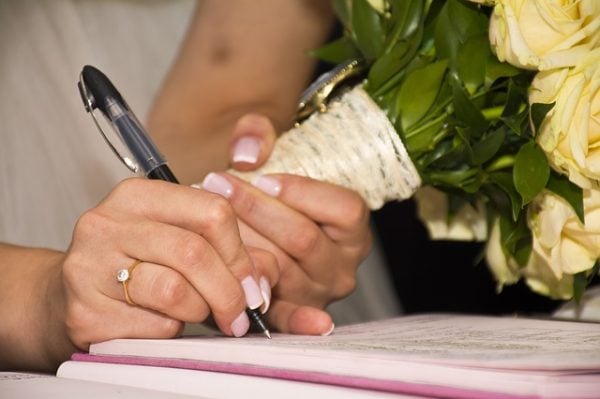
A marriage license is what you get before getting married. Having this document doesn't mean you're officially husband and wife. It only authorizes you and your soon-to-be spouse to marry anywhere in the Philippines, so it's like the approval of your application for marriage.
On the other hand, a marriage certificate is what you get after getting married. This document is proof that your partner is your legal spouse and that your marriage took place legally. It also contains the important details of your wedding such as the date and place.
In the Philippines, a marriage contract is just another term used when referring to the marriage certificate.
2. Can we get married in a different place from where we got our marriage license?
Some couples wrongly assume that a marriage license is valid only in the city or municipality where it was issued. However, Article 20 of the Family Code of the Philippines clearly states that the document is "valid in any part of the Philippines."
This means if you got a marriage license in Cebu, you can marry in Manila or anywhere in the country, as long as it's used within the 120-day validity period.
3. Can two foreigners get married in the Philippines?
Yes. Another common myth about getting married in the Philippines is that one of the soon-to-weds must be a Filipino citizen. The Family Code doesn't prohibit two foreign citizens from holding their wedding in the Philippines, as long as they meet the legal requirements for marriage in the country.
4. How can a foreigner get married in the Philippines?
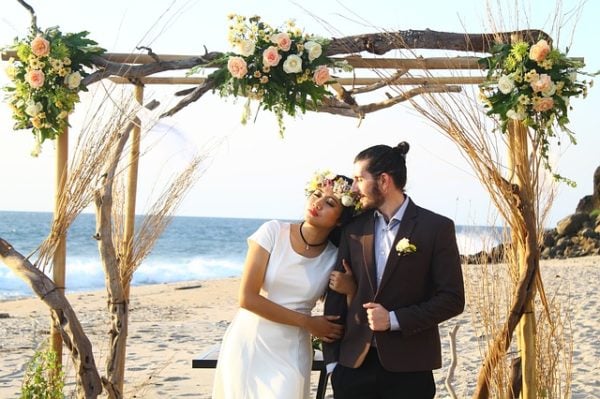
The general procedure of getting married in the Philippines is quite the same for Filipinos and foreigners.
The biggest difference is that foreign citizens are required to submit a Certificate of Legal Capacity to Contract Marriage (instead of a birth certificate and CENOMAR) when they apply for a marriage license. This document confirms that there are no legal impediments to the foreigner who will get married.
Foreigners who wish to marry in the Philippines should get this certification from their home country's embassy or consular office.
The application process and requirements for the Certificate of Legal Capacity to Marry vary per country, so it's best to contact the local embassy to know the specifics. To find the contact information of your home country's embassy in the Philippines, check the Department of Foreign Affairs website.[5]
For example, instead of the certification, the U.S. and Chinese embassies in the Philippines issue an Affidavit in Lieu of a Certificate of Legal Capacity to Contract Marriage. Meanwhile, the Australian embassy issues a Certificate of No Impediment to Marriage (CNI).
After getting married in the Philippines, foreigners are also required to get their marriage registered in their home country within a prescribed period. To do so, contact the embassy to inquire about how to report your marriage.
5. Can you get married without a marriage license in the Philippines?

Certain kinds of marriages or unions are exempted from providing a marriage license.
Under Article 34 of the Family Code, couples who have been living together as common-law husband and wife for at least five years (before the wedding date) and without any legal impediment to marriage can get married without the need for a marriage license.
The law requires such couples to execute an affidavit stating such facts. Also, the solemnizing officer must execute a sworn statement proving that he has verified the qualifications of the parties and found no legal impediment to your marriage.
Muslims and members of ethnic communities in the Philippines are also not required to submit a marriage license, as long as they get married according to their customs.
For the full list of marriage license exemptions, refer to Chapter 2 (Articles 27 to 34) of the Family Code.
6. How many copies of CENOMAR are needed for securing a marriage license?
You have to provide only one original copy and one photocopy of your CENOMAR, as well as those of your partner. Contact the LCR office of your city/municipal hall to verify this requirement.
7. Where can I see a sample form of a marriage contract in the Philippines?
If you need a marriage certificate form for your walk-in application, you can download it from the PSA website.[6]
To access a sample marriage contract in the Philippines, you can find one when you search for it on Google. For your easy reference, here's what a sample marriage certificate from the LCR looks like:

8. Can I get copies of the marriage certificate for both my civil and church weddings?
According to the PSA,[7] the first registered marriage is the one considered valid. For example, if you had a civil wedding first before you got married in a church, then the PSA will issue the marriage contract that was registered first at the local civil registrar.
On the other hand, if you had a church wedding without a civil wedding beforehand, the marriage is still recognized as legal in the Philippines. The marriage certificate you'll get from the PSA is the one you signed during your church rites.
9. How long does it take before I get the marriage certificate after our wedding in the Philippines?
Around five to 10 working days after the officiant registered your marriage, you can get a certified true copy of your marriage certificate at the LCR office.
A PSA-certified marriage certificate in the Philippines takes longer to process than an LCR-issued certificate. The actual processing time depends on how fast the LCR transmits your marriage contract to the PSA. Wait for at least two to three months for your marriage certificate to become available at the PSA.
Final Thoughts
Note that this guide is not a form of expert legal advice. It's only meant to provide general guidelines on how to get married, including how to get a marriage contract, so that you know what to expect during your wedding preparations. You and your partner are primarily responsible for ensuring your compliance with the legal requirements for marriage in the Philippines.
Is a lack of funds keeping you from pushing through with your wedding plans? Consider getting a bank loan in the Philippines to get extra cash for your wedding expenses.

Sources:
- [1] Family Code of the Philippines (Official Gazette)
- [2] PSA Census Serbilis Centers
- [3] How to Get a Marriage License (Quezon City Government official website)
- [4] Marriage Certificate Definition (PSA website)
- [5] List of Foreign Embassies in the Philippines (DFA website)
- [6] Marriage Contract Application Form (PSA website)
- [7] PSA Serbilis FAQs







_1200x350.png?width=751&height=219&name=UB_PL_Generic_2_(Jan_2025)_1200x350.png)
